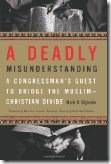Some selected quotes from Chawkat Moucarry’s article at the Lausanne Conversation, “A Plea for Dialogue Between Christians and Muslims”:
I have never really understood why some people look at dialogue and mission in terms of either/or. Evangelical Christians in particular (whose theology I share) have shown an unwarranted suspicion for dialogue simply because it has been used by some as a substitute for mission. These words should never be divorced: not only are the two words compatible, but they must shape each other…
Is conversion a legitimate outcome to dialogue? Yes: it is perfectly legitimate for believers, who take seriously the exclusive claims of their religion, to try to persuade others. There is nothing wrong with hoping, and even expecting, that some people, having carefully examined these claims, will make a life-changing decision as a result of a transparent and free dialogue. Unless we accept conversion as a possible outcome for dialogue our claim to be tolerant remains unproven.
He also highlights “some implications for us Christians who want to engage missiologically with Islam and Muslims”:
- Show respect to Muslims and to what is at the heart of their identity, i.e. their Prophet, their religion, and their Scriptures.
- We should do our best to be fair.
- We need to study Islam and befriend Muslims.
The conclusion:
A Christian perspective on Islam ought to be incarnational, sympathetic and critical. It should be concerned more with Muslim people than with Islam. As disciples of Jesus Christ, we are under a double obligation to love our Muslim neighbours as ourselves and to share the good news with them. Not only do the two commands go hand in hand but the second is best carried out as an expression of the first. Dialogue is indeed the privileged way of ‘speaking the truth in love’ (Ephesians 4:15) to Muslims as well as to other religious communities.
Read the whole thing (3 pages).
Related: Fundamental Difference Between Islam and Biblical Faith (with a link to a PDF of a nice article by Moucarry on Islam)


